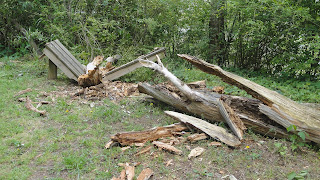As I mentioned in our last post, we drove the two miles or so back to Weldon again on Wednesday. There were a few more things we wanted to check out.
Not only is Weldon the Rockfish Capital of the World, back in the day, Weldon was also known for its railroad. The first railway charter in the United States was the Baltimore and Ohio in 1827. In early 1830, the Commonwealth of Virginia chartered the Petersburg Railroad Company to run a line to connect the Appomattox River to the Roanoke River near Weldon. The Wilmington and Weldon Railroad was the longest railroad in the world when it was completed in 1840 -- a whopping 161 1/2 miles long. By 1855, five rail companies operated lines to and through Weldon and some termed Weldon as the "Railroad Capital of the World."
Today the old train station stands proudly as a reminder of Weldon's railroad history. In 1924, the station was converted into the town's library and is still active as such today.
Today the old train station stands proudly as a reminder of Weldon's railroad history. In 1924, the station was converted into the town's library and is still active as such today.
A daily average of 54 Amtrak and CSX Freight Trains pass overhead in Weldon.
We also saw a couple of Amtrak trains go by, but we were never in a position to take a picture.
We also saw a couple of Amtrak trains go by, but we were never in a position to take a picture.
Weldon Freight Depot ca 1840 -- now a radio station
We even found the little red caboose
Alan sitting where the brakeman sat
Yes, that is the toilet
There was once a wood stove to the left of the wood box
Since fishermen come from all over this time of the year to catch a rockfish, we wanted to see the Roanoke River to see what we could see. We were surprised when we pulled in the parking lot near the boat launch and saw all the trucks with empty trailers. Yep, the fishermen showed up for sure.
All different kinds of boats
And even those without a boat, but he does have a helper
The rapids of the Roanoke River
If you know what a barbless hook is, please tell us.
Is this the way to the trail?
Uh-Oh, Mother Nature Struck Here
Oops, end of the trail from this direction
One last thing we wanted to find before we left Weldon and that was the Confederate Cemetery. We looked and looked and couldn't find it. We stopped at the Library to ask and they didn't know. We went back and once again followed the very small signs and we finally found it -- at the end of a street.
It was so grown up and was not in a very good area, so we debated whether to park and walk to see what we could.
We decided we came this far we weren't going to turn back now. We just hoped we would not get any ticks or chiggers -- or even mugged. Since I was born in North Carolina, I was interested to see if anyone with my maiden name (Potts) was buried in this cemetery.
There were very few visible headstones
This headstone states nearly 100 soldiers were buried here from 1861-1865.
When we stopped at the Library to ask for directions to the cemetery, although "Maggie" didn't know the location of the cemetery, she printed some information for us. (She wouldn't let us take her pic). In 2009, this unmarked burial area erected a large marble marker that contains the names of the 170 soldiers buried here.
And lo and behold there it was -- third name from the bottom
"Peter W.M. Potts Co. E 42ND N.C. APR 15, 1863"
What a surprise that was for me -- I couldn't help but wonder who he was and could we in fact be related?
Thousands of Confederate soldiers were kept in and around Weldon at all times. They suffered from various diseases and many died. Through the years, many efforts have been made to restore and preserve the cemetery. The land belonged to a woman who would not sell it or permit improvement. She passed away and the land was sold to uninterested persons and the cemetery fell into a sad state. In 1913, the soldiers' cemetery came into the hands of a highly respected black man, David Smith, who said he had known these men and learned to love them and he would give the land to the local United Daughters of the Confederacy. Sadly, the chapter of this particular UDC disbanded in 1986. Since 2009 when the memorial was erected, the cemetery has once again become an eyesore -- as you could see from the pictures.
Downtown Weldon today
Surrounding area
We always say when you see a rule, there has to be a reason for it, but we couldn't help but wonder how they plan to enforce this one?
What a life...
This little guy started our day off just singing away outside our window
You just never know what you'll find until you get out and explore
-- even in and around the small towns of America or Canada, or wherever you may be.
That's it for now and that's pretty much it for Weldon, North Carolina, population 2,879. Who knows what we will find next. Thanks for stopping by -- we hope you have enjoyed our small look at small town America. Until next time, God bless you one and all.





































































